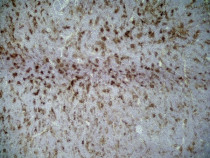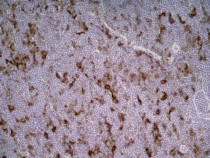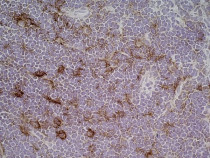ARG23462
anti-CD86 antibody [24F]
anti-CD86 antibody [24F] for Flow cytometry,IHC-Frozen sections,Immunoprecipitation and Rat
Overview
| Product Description | Mouse Monoclonal antibody [24F] recognizes CD86 Mouse anti Rat CD86 antibody, clone 24F recognizes rat CD86, otherwise known as B7-2, a type I transmembrane protein and member of the Ig superfamily, which acts as a ligand for both CD28 and CD152 (CTLA-4), and is primarily expressed on antigen presenting cells (APCs) including dendritic cells, and also on germinal centre B cells and macrophages. Like CD80, CD86 is an accessory molecule which functions in the CD28-CD80/CD86 co-stimulatory pathway, vital for T cell activation, crosstalk between T and B cells, and Th2-mediated Ig production. Mouse anti Rat CD86 antibody, clone 24F has been shown to block the co-stimulatory activity of rat CD86 (Maeda et al. 1997). |
|---|---|
| Tested Reactivity | Rat |
| Tested Application | FACS, IHC-Fr, IP |
| Host | Mouse |
| Clonality | Monoclonal |
| Clone | 24F |
| Isotype | IgG1 |
| Target Name | CD86 |
| Antigen Species | Rat |
| Immunogen | HTLV-1 transformed Lewis-S1 cells. |
| Conjugation | Un-conjugated |
| Alternate Names | B70; B7.2; LAB72; CD antigen CD86; B7-2; FUN-1; CD28LG2; T-lymphocyte activation antigen CD86; CTLA-4 counter-receptor B7.2; Activation B7-2 antigen; BU63 |
Application Instructions
| Application Suggestion |
|
||||||||
|---|---|---|---|---|---|---|---|---|---|
| Application Note | FACS: Use 10 µl of the suggested working dilution to label 10^6 cells in 100 µl. * The dilutions indicate recommended starting dilutions and the optimal dilutions or concentrations should be determined by the scientist. |
Properties
| Form | Liquid |
|---|---|
| Purification | Purification with Protein G. |
| Buffer | PBS and 0.09% Sodium azide. |
| Preservative | 0.09% Sodium azide |
| Concentration | 1 mg/ml |
| Storage Instruction | For continuous use, store undiluted antibody at 2-8°C for up to a week. For long-term storage, aliquot and store at -20°C or below. Storage in frost free freezers is not recommended. Avoid repeated freeze/thaw cycles. Suggest spin the vial prior to opening. The antibody solution should be gently mixed before use. |
| Note | For laboratory research only, not for drug, diagnostic or other use. |
Bioinformation
| Gene Symbol | CD86 |
|---|---|
| Gene Full Name | CD86 molecule |
| Background | This gene encodes a type I membrane protein that is a member of the immunoglobulin superfamily. This protein is expressed by antigen-presenting cells, and it is the ligand for two proteins at the cell surface of T cells, CD28 antigen and cytotoxic T-lymphocyte-associated protein 4. Binding of this protein with CD28 antigen is a costimulatory signal for activation of the T-cell. Binding of this protein with cytotoxic T-lymphocyte-associated protein 4 negatively regulates T-cell activation and diminishes the immune response. Alternative splicing results in several transcript variants encoding different isoforms.[provided by RefSeq, May 2011] |
| Function | Receptor involved in the costimulatory signal essential for T-lymphocyte proliferation and interleukin-2 production, by binding CD28 or CTLA-4. May play a critical role in the early events of T-cell activation and costimulation of naive T-cells, such as deciding between immunity and anergy that is made by T-cells within 24 hours after activation. Isoform 2 interferes with the formation of CD86 clusters, and thus acts as a negative regulator of T-cell activation. [UniProt] |
| Calculated MW | 38 kDa |
| PTM | Polyubiquitinated; which is promoted by MARCH8 and results in endocytosis and lysosomal degradation. [UniProt] |
Images (3) Click the Picture to Zoom In
-
ARG23462 anti-CD86 antibody [24F] IHC-Fr image
Immunohistochemistry: Rat lymph node cryosection stained with ARG23462 anti-CD86 antibody [24F] followed by HRP-conjugated Goat anti Mouse IgG. (Low power).
-
ARG23462 anti-CD86 antibody [24F] IHC-Fr image
Immunohistochemistry: Rat lymph node cryosection stained with ARG23462 anti-CD86 antibody [24F] followed by HRP-conjugated Goat anti Mouse IgG. (Medium power).
-
ARG23462 anti-CD86 antibody [24F] IHC-Fr image
Immunohistochemistry: Rat lymph node cryosection stained with ARG23462 anti-CD86 antibody [24F] followed by HRP-conjugated Goat anti Mouse IgG. (High power).








